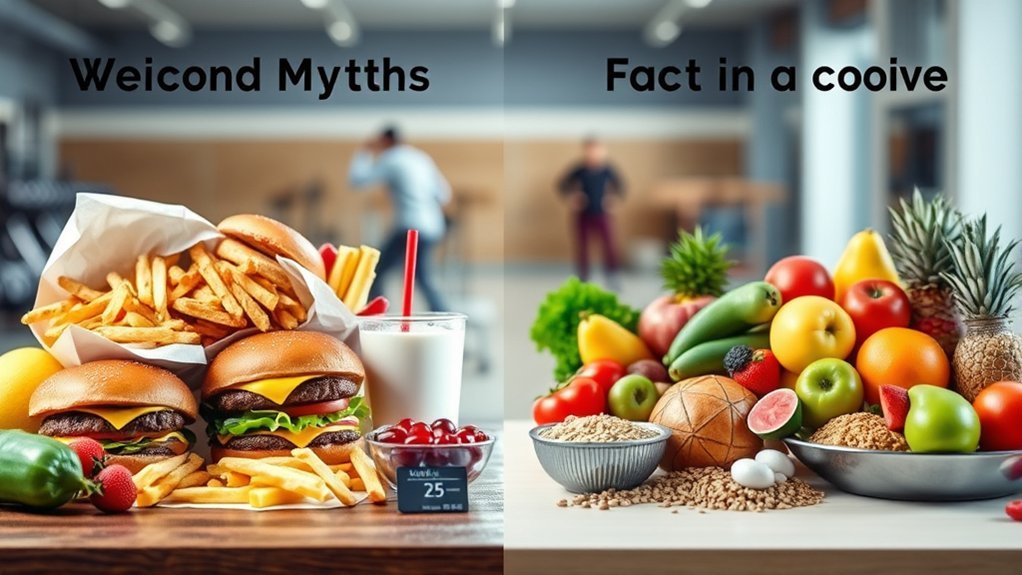When it comes to weight gain, many people find themselves maneuvering a maze of misconceptions. You might think that simply consuming more calories will lead to quick results, but that’s not the whole story. Understanding the nuances behind weight gain can help you make informed choices. Are you aware of how the quality of your food and strength training play pivotal roles in achieving your goals? Let’s unpack these myths and facts together.
Understanding Weight Gain: The Basics

When you think about weight gain, it’s essential to understand that it’s primarily a result of consuming more calories than your body uses. Your body requires a certain number of calories for basic functions like breathing and digestion, known as your basal metabolic rate (BMR).
When you eat more than this amount, the excess calories can lead to weight gain over time. Factors like age, gender, activity level, and genetics also play significant roles in how your body processes calories.
Additionally, not all calories are equal; the types of food you eat can influence your metabolism and hunger levels. Balancing calorie intake with energy expenditure is vital for maintaining a healthy weight, so being mindful of both is key.
Myth 1: You Can Gain Weight Overnight

You might believe you can gain weight overnight, but that’s not quite accurate.
Fluctuations in water weight and metabolic rate play a significant role in what you see on the scale.
Understanding these factors is essential for developing sustainable weight gain strategies.
Metabolic Rate Misconceptions
Despite popular belief, gaining weight overnight isn’t possible, as the body requires time to process food and convert it into fat.
Your metabolic rate plays a vital role in weight management, as it determines how efficiently your body burns calories. Many think that a slow metabolism is solely to blame for weight gain, but factors such as age, muscle mass, and activity level also contribute.
While it’s true that some people have a naturally slower metabolism, you can influence yours through regular exercise and a balanced diet.
Instead of fixating on overnight changes, focus on sustainable habits that promote a healthy metabolic rate, helping you reach your weight goals over time.
Water Weight Fluctuations
While many people believe they can gain weight overnight, this is often a misconception rooted in misunderstandings about water weight. Your body naturally retains water due to factors like diet, salt intake, and hormonal changes.
When you consume more sodium or carbohydrates, your body can hold onto extra water, which may reflect as a sudden weight increase on the scale. However, this fluctuation is temporary and doesn’t indicate actual fat gain.
It’s essential to understand that daily weight changes are normal and primarily related to water retention, not fat accumulation. By focusing on long-term trends rather than daily fluctuations, you’ll gain a clearer perspective on your weight management journey.
Sustainable Weight Gain Strategies
Understanding the nuances of weight fluctuations helps clarify common misconceptions about weight gain, including the myth that you can gain weight overnight. Realistically, sustainable weight gain requires time, consistency, and a balanced approach.
| Factor | Impact on Weight Gain |
|---|---|
| Caloric Surplus | Crucial for gaining weight |
| Muscle Gain | Gradual process, not instant |
| Water Retention | Temporary, not true weight |
To achieve lasting weight gain, focus on nutrient-dense foods, strength training, and regular meals. Consistently consuming more calories than you burn is important, but remember, it’s a gradual process. Patience and commitment will lead to sustainable results, debunking the overnight gain myth effectively.
Myth 2: All Calories Are Created Equal

Many people assume that all calories are alike, but this myth oversimplifies the complex relationship between food and your body.
While it’s true that a calorie is a unit of energy, the source of that calorie matters greatly. For example, 100 calories from a sugary snack can affect your body differently than 100 calories from a nutrient-rich meal.
Foods high in sugar and unhealthy fats can lead to rapid spikes in blood sugar, while whole foods often provide essential nutrients that support overall health. Your body processes these calories differently, influencing your metabolism, hunger levels, and even your mood.
Fact: The Importance of Nutrient-Dense Foods
When you focus on nutrient-dense foods, you’re not just fueling your body; you’re also setting the stage for healthier weight management.
Nutrient-dense foods, like fruits, vegetables, whole grains, lean proteins, and healthy fats, provide essential vitamins and minerals with fewer empty calories. This means you can feel satisfied while consuming fewer calories, which is vital for weight control.
Research shows that prioritizing these foods can help optimize metabolic health and reduce cravings, making it easier to maintain a balanced diet. Additionally, the fiber in these foods promotes satiety, helping you manage portion sizes effectively.
Myth 3: Weight Gain Is Only About Eating More
It’s a common misconception that simply eating more will lead to weight gain, but the quality of those calories matters just as much.
Nutrient-dense foods can support your health while contributing to a balanced diet, whereas empty calories can hinder your progress.
Additionally, your metabolism plays an essential role in how your body processes the food you consume, affecting weight gain considerably.
Nutrient Quality Matters
While some may believe that weight gain is solely a result of consuming more calories, the truth is that nutrient quality plays a crucial role in how your body processes those calories.
Foods rich in nutrients—like whole grains, lean proteins, healthy fats, and fruits—provide essential vitamins and minerals that support metabolic functions. In contrast, highly processed foods may lead to weight gain without delivering adequate nutrition.
Research shows that a diet high in nutrient-dense foods can help you gain weight in a healthier way, promoting muscle rather than fat. Quality matters just as much as quantity; choosing the right foods can make a significant difference in how your body stores and utilizes energy.
Metabolism’s Role in Weight
Although many people think that weight gain is solely about consuming more calories, metabolism plays a significant role in how your body processes those calories. Your metabolic rate, which varies from person to person, determines how efficiently your body converts food into energy.
Factors like age, gender, muscle mass, and hormonal levels can influence this rate. For instance, individuals with higher muscle mass tend to burn more calories at rest compared to those with less muscle.
Additionally, metabolic adaptations can occur, meaning your body might adjust its energy expenditure based on your eating habits and activity levels. As a result, it’s crucial to take into account both calorie intake and metabolic function when addressing weight gain, rather than focusing solely on eating more.
Fact: The Role of Strength Training in Weight Gain
Strength training plays an essential role in healthy weight gain, especially for those looking to build muscle rather than simply adding fat. Engaging in resistance exercises helps stimulate muscle hypertrophy, which is vital for increasing lean body mass.
Research shows that combining strength training with a caloric surplus maximizes muscle growth, ensuring that the weight you gain is primarily muscle instead of fat. Aim for compound movements like squats, deadlifts, and bench presses, as they work multiple muscle groups simultaneously.
Consistency is key; regular workouts paired with adequate protein intake can lead to significant gains over time. Remember, while weight gain can be a goal, prioritizing muscle growth through strength training can lead to a healthier, more sustainable body composition.
Myth 4: Supplements Are Essential for Gaining Weight
Many people believe that supplements are a must for gaining weight, but this isn’t necessarily true. While certain products can help, they shouldn’t replace whole foods.
Supplements aren’t essential for weight gain; whole foods should be the foundation of your diet.
A balanced diet rich in calories from nutrient-dense foods like nuts, avocados, and lean proteins can effectively support your weight gain goals. Research shows that whole foods not only provide the necessary calories but also deliver essential vitamins and minerals that supplements often lack.
Furthermore, relying solely on supplements might lead to an unbalanced diet, which can hinder overall health. Focus on building a solid meal plan and engaging in strength training to create muscle mass.
In many cases, you can achieve your weight gain goals without turning to supplements as the primary solution.
Setting Realistic Weight Gain Goals
Setting realistic weight gain goals is key to achieving lasting success. Focus on gradual increases rather than drastic changes. Aim for about 0.5 to 1 pound per week, which is sustainable and healthier.
It’s important to evaluate your body type, activity level, and metabolic rate when setting these targets. Keep in mind that everyone’s journey is different; don’t compare yourself to others.
Incorporating strength training can help you build muscle effectively, while a balanced diet rich in protein supports your efforts. Regularly assess your progress and adjust your goals as needed.
Frequently Asked Questions
Can Stress Affect My Weight Gain Journey?
Yes, stress can considerably affect your weight gain journey. It may lead to emotional eating or hormonal changes that impact appetite. Managing stress through healthy coping strategies can help you maintain a balanced approach to weight gain.
How Do Genetics Influence Weight Gain?
Just like a family recipe, genetics play an essential role in your weight gain. They influence metabolism, fat storage, and appetite. Understanding your genetic predispositions can help you tailor a more effective weight management strategy.
Is It Possible to Gain Weight Healthily?
Yes, you can gain weight healthily by focusing on nutrient-dense foods, regular strength training, and balanced meals. Prioritize whole grains, lean proteins, healthy fats, and stay consistent with your efforts for the best results.
What Role Does Sleep Play in Weight Gain?
Sleep plays an essential role in weight gain; studies show that insufficient sleep can lead to a 20% increase in hunger hormones. Prioritizing quality sleep helps regulate appetite, making it easier to manage your weight effectively.
Can I Gain Weight Without Strength Training?
Yes, you can gain weight without strength training by consuming more calories than you burn. However, focusing on nutrient-dense foods and incorporating some form of physical activity can promote healthier weight gain and muscle development.
Conclusion
In the quest for weight gain, remember that it’s not just about eating more—it’s about eating right. Like trying to build a solid house on sand, relying solely on quick fixes or supplements won’t lead to lasting results. Focus on nutrient-dense foods and incorporate strength training to achieve sustainable weight gain. Set realistic goals, and you’ll see progress that stands the test of time. Embrace the journey, and you’ll build a healthier you, brick by brick.
